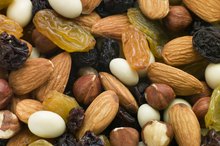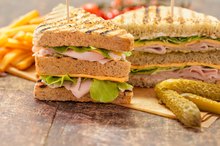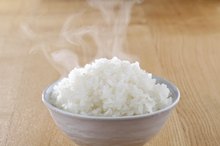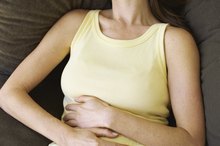Diverticular disease was traditionally believed to be caused by a low-fiber diet, but according to The National Digestive Diseases Information Clearinghouse, the cause currently remains unknown 14. It is important to differentiate between the two forms of diverticular disease, diverticulosis and diverticulitis, because the treatments vary significantly 24. Additional dietary fiber is recommended with diverticulosis, whereas with diverticulitis, high-fiber foods and fiber supplements like Metamucil should be avoided 3. If you think you may have diverticular disease, check with your health care provider for advice on how to best treat your condition.
Difference Between Diverticulitis and Diverticulosis
Diverticulosis is defined as the presence of diverticula, small pouches that form through weak spots in the colon wall. Many people with diverticulosis do not have any symptoms, but some experience constipation, diarrhea, or chronic cramping or pain in the lower abdomen. When diverticula become swollen or inflamed, the condition is known as diverticulitis. With diverticulitis, you might experience pain in the lower left side of your abdomen, fevers, chills, nausea, vomiting, constipation, diarrhea or bleeding. Medical treatment will vary depending on whether you have diverticulosis or diverticulitis.
- Diverticulosis is defined as the presence of diverticula, small pouches that form through weak spots in the colon wall.
- With diverticulitis, you might experience pain in the lower left side of your abdomen, fevers, chills, nausea, vomiting, constipation, diarrhea or bleeding.
Psyllium Fiber
Do Some Foods Aggravate Diverticulitis?
Learn More
Metamucil is a brand of a psyllium fiber supplement 35. Psyllium fiber, or psyllium husk, comes from the Plantago ovata plant and is considered a bulk-forming fiber. Metamucil products can be bought over the counter in the form of capsules, wafers or powders that can be added to foods or beverages 3. If you choose to use fiber supplements, take them with at least 8 ounces of water to prevent constipation. Fiber and fluids help keep bowel movements soft and add bulk, which allows easier passage. This can help prevent progression of diverticulosis to diverticulitis.
- Metamucil is a brand of a psyllium fiber supplement 3.
- Fiber and fluids help keep bowel movements soft and add bulk, which allows easier passage.
Management of Diverticulitis
During a diverticulitis flare-up, high-fiber foods and fiber supplements like Metamucil should be avoided 3. These may worsen your symptoms or even lead to the development of complications. The NDDIC recommends a combination of rest, oral antibiotics and liquids until symptoms resolve. As you start to recover, you can slowly add-low fiber solid foods back into your diet.
- During a diverticulitis flare-up, high-fiber foods and fiber supplements like Metamucil should be avoided 3.
Management of Diverticulosis
A Diverticulitis Diet Without Wheat
Learn More
The mainstay of treatment for diverticulosis is the addition of high-fiber foods or fiber supplements, such as Metamucil 3. Fiber supplements may be easier to include than high-fiber foods; however, high-fiber foods and a healthy diet are always best. Experts at the NDDIC recommend you eat 14 grams of fiber per 1,000 calories consumed, which translates to 28 grams of fiber daily if you follow a 2,000-calorie diet. You should increase your fiber intake gradually and remember to drink plenty of fluids -- at least 8 cups of water per day -- to help avoid constipation.
- The mainstay of treatment for diverticulosis is the addition of high-fiber foods or fiber supplements, such as Metamucil 3.
- Fiber supplements may be easier to include than high-fiber foods; however, high-fiber foods and a healthy diet are always best.
Related Articles
References
- Metamucil: Metamucil Fiber Products
- UCSF Medical Center: Diverticular Disease and Diet
- Metamucil: How a Psyllium Fiber Diet Benefits You
- Barroso AO, Quigley EM. Diverticula and diverticulitis: time for a reappraisal. Gastroenterology & Hepatology. 2015;11(10):680-8.
- NIH National Institute of Diabetes and Digestive and Kidney Diseases. Eating, diet, & nutrition for diverticular disease. Updated May 2016.
- Harvard T.H. Chan. Carbohydrates and blood sugar.
- Today’s Dietician. Fiber & irritable bowel syndrome – strategies for counseling patients. Updated August 2016.
- Stanford Hospital & Clinics. Low fiber diet for diverticulitis. Updated January 2014.
- The Oregon Clinic. BRAT diet for nausea, vomiting, or diarrhea.
- Nallapeta NS, Foris LA, Tuma F, et al. Diverticulosis. In: StatPearls. Updated December 13, 2019.
- Carabotti M, Annibale B. Treatment of diverticular disease: an update on latest evidence and clinical implications. DIC. 2018;7:1-11. doi:10.7573/dic.212526
- University of California, San Francisco Health. Diverticular disease and diet.
- American Society of Colon and Rectal Surgeons. Diverticular disease expanded version.
- Rezapour M, Ali S, Stollman N. Diverticular disease: An update on pathogenesis and management. Gut Liver. 2018;12(2):125-132. doi:10.5009/gnl16552
- Strate LL, Keeley BR, Cao Y, Wu K, Giovannucci EL, Chan AT. Western dietary pattern increases, and prudent dietary pattern decreases, risk of incident diverticulitis in a prospective cohort study. Gastroenterology. 2017;152(5):1023-1030.e2. doi:10.1053/j.gastro.2016.12.038
- Dahl C, Crichton M, Jenkins J, et al. Evidence for dietary fibre modification in the recovery and prevention of reoccurrence of acute, uncomplicated diverticulitis: A systematic literature review. Nutrients. 2018; 10(2):137-. doi:10.3390/nu10020137
- Eglash A, Lane CH. What is the most beneficial diet for patients with diverticulosis? J Fam Pract. 2006 September;55(9):813-814.
- Office of Disease Prevention and Health Promotion. Dietary Guidelines 2015-2020.
- Barroso AO, Quigley EM. Diverticula and diverticulitis: time for a reappraisal. Gastroenterology & Hepatology. 2015;11(10):680-8.
- Strate LL, Morris AM. Epidemiology, pathophysiology, and treatment of diverticulitis. Gastroenterology. 2019;156(5):1282-1298.e1. doi:10.1053/j.gastro.2018.12.033
- Okawa Y, Fukudo S, Sanada H. Specific foods can reduce symptoms of irritable bowel syndrome and functional constipation: a review. BioPsychoSocial Med. 2019;13:10. doi:10.1186/s13030-019-0152-5
- NIH National Institute of Diabetes and Digestive and Kidney Diseases. Eating, diet, & nutrition for diverticular disease. Updated May 2016.
- HealthLink BC. Healthy eating guidelines for people with diverticular disease. Updated April 2019.
- Severi C, Carabotti M, Cicenia A, Pallotta L, Annibale B. Recent advances in understanding and managing diverticulitis. F1000 Res. 2018;7:971-. doi:10.12688/f1000research.14299.1
- Dashti HS, Mogensen KM. Recommending small, frequent meals in the clinical care of adults: a review of the evidence and important considerations. Nutr Clin Pract. 2016;32(3):365-377. doi:10.1177/0884533616662995
- Harvard T.H. Chan. Carbohydrates and blood sugar.
- Today’s Dietician. Fiber & irritable bowel syndrome – strategies for counseling patients. Updated August 2016.
- McRorie, JW. Evidence-based approach to fiber supplements and clinically meaningful health benefits, part 2. Nutrition Today. 2015;50(2):90-97. doi:10.1097/NT.0000000000000089
- Stanford Hospital & Clinics. Low fiber diet for diverticulitis. Updated January 2014.
- Abdullah MMH, Gyles CL, Marinangeli CPF, Carlberg JG, Jones PJH. Dietary fibre intakes and reduction in functional constipation rates among Canadian adults: a cost-of-illness analysis. Food & Nutrition Research. 2017;59(1):28646. doi:10.3402/fnr.v59.28646
- The Oregon Clinic. BRAT diet for nausea, vomiting, or diarrhea.
- Uno Y, Velkinburgh JCv. Logical hypothesis: low FODMAP diet to prevent diverticulitis. WJGPT. 2016;7(4):503-512. doi:10.4292/wjgpt.v7.i4.503
- Harvard Medical School Harvard Health Publishing. Diverticular disease prevention and treatment. Updated February 2011.
- Ünlü C, Daniels L, Vrouenraets B, Boermeester M. A systematic review of high-fibre dietary therapy in diverticular disease. Int J Colorectal Dis. 2011;27(4):419-427. doi:10.1007/s00384-011-1308-3
- Weir SBS, Akhondi H. Bland Diet. In:StatPearls. Updated March 9, 2019.
Writer Bio
Leah Wargolet graduated from the University of Wisconsin, Madison, with a Bachelor of Science in dietetics. She then completed her dietetic internship at California State University, Fresno, to become a registered dietitian. Wargolet recently completed her Master of Science in Physician Assistant Practice degree.









